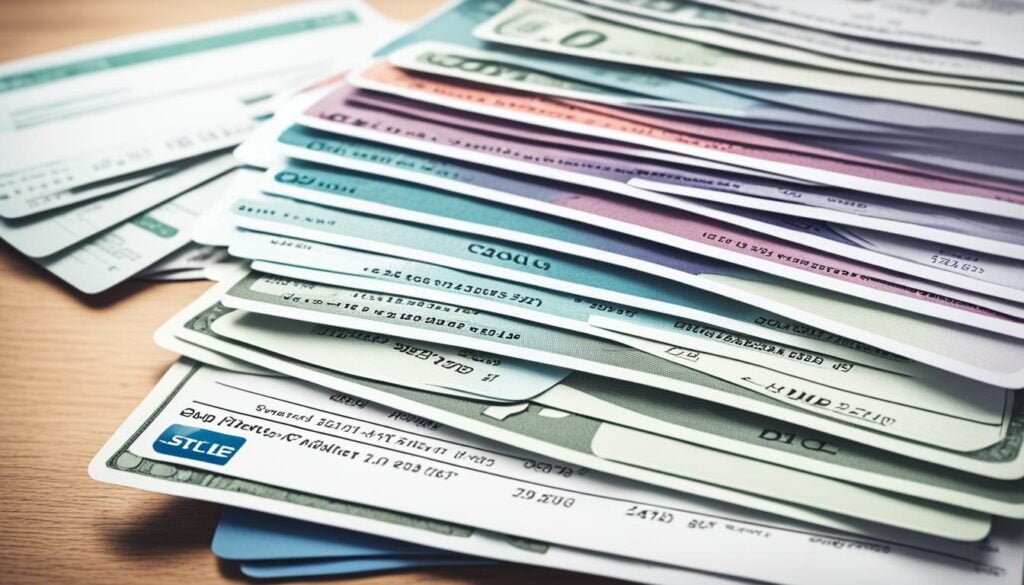Refinancing your personal loan can make interest rates lower. It can also reduce how much you pay each month and help you save money. To start, you must check your credit score. Also, look for the best rates and compare loan terms and fees from various lenders. If you have a better credit score, want to change from a variable to fixed rate, or need to lower your monthly payments, it might be a good time to refinance. Following these steps can get you a loan that’s better for your wallet.
Key Takeaways
- Understand the benefits of personal loan refinance, such as lower interest rates and reduced monthly payments.
- Check your credit score and work on improving it to qualify for better personal loan refinance terms.
- Shop around and compare offers from multiple lenders to find the best personal loan refinance rates and terms.
- Consider factors like variable-to-fixed rate changes and the need for lower payments when deciding to refinance your personal loan.
- Follow the right steps to secure a more favorable personal loan refinance that fits your financial goals.
What is Personal Loan Refinance?
Personal loan refinancing is replacing an old personal loan with a new one. This new loan might have better terms and conditions. Borrowers aim to save money by getting a lower interest rate, longer repayment time, or by merging several debts into one.
Understanding the Concept of Loan Refinancing
Personal loan refinancing means you take a new loan to pay off an old one. The aim is to get more favorable terms like a lower interest rate or longer loan term. This can cut monthly payments or reduce the interest charges over the loan’s life.
This way, borrowers can adjust their loan to meet their current financial needs and future goals.
Reasons to Refinance a Personal Loan
Many might think about refinancing their personal loan for various reasons. This might include:
- Getting a lower interest rate to save on interest
- Moving from a variable-rate to a fixed-rate loan for steady payments
- Mixing several high-interest debts into one low-interest loan
- Making monthly payments smaller by extending the loan term
Knowing about personal loan refinancing helps people decide if it fits their money situation.
Improving Your Credit Score

Your credit score is vital for getting a good personal loan refinance. If you have a high score, you can get a lower interest rate. This can save a lot of money over time. To boost your score before refinancing, focus on a few strategies.
Why Credit Score Matters for Loan Refinancing
Lenders check your credit score to see how reliable you are with money. With a high score, lenders trust you more. This trust means you’re offered better loan terms, like a lower interest rate. Over time, this can save a lot of money on your refinance loan.
Tips to Boost Your Credit Score
So, aiming to boost your credit score for a refinance? Here’s how:
- Always pay bills on time: Your payment history is key to your credit score. So, keep it clean by paying on time.
- Keep your credit card balances low: It’s good to have low balances compared to your credit limits. This can help your credit score.
- Fix credit report mistakes: Check your credit report for errors. If you spot any, fix them to help your score.
- Don’t open many new credit accounts: Opening too many accounts could hurt your score. It leads to hard inquiries on your report, which drop your score a bit.
Improving your credit score takes effort. But, it really pays off when you want a good personal loan refinance. By following these steps, you can get better loan terms. This saves you money in the end.
Also Read :Cash Advance Loans: Get Fast Cash When You Need It Most
Evaluating Loan Options

When you’re looking into personal loan refinance, it’s key to compare offers from many lenders. You want the best interest rates and loan terms. Look at the APR to understand the total cost. Check for any extra fees like origination fees or prepayment penalties. These can change how affordable the refinance is.
Pay close attention to the loan’s term length. Longer terms can lower what you pay each month. But they might raise the total interest cost. Considering these points will help you find the best refinance. This way, you can save the most.
Comparing Interest Rates and Terms
To pick the best personal loan refinance, compare rates and terms from different lenders. The APR shows the total loan cost. This includes interest and any fees. Also think about the loan’s term. It affects both monthly payments and total interest cost.
Considering Fees and Charges
Refinancing a personal loan can include several costs. You should look out for and understand these fees. Origination fees can be 1% to 8% of the loan. Another fee to be careful of is the prepayment penalty for early payoff. There might also be application fees, closing costs, or other small charges. Knowing about these expenses beforehand can let you see if refinancing will really save you money over time.
Also Read :Can I Get An Upgrade Loan For Home Improvements?
Debt Consolidation and Refinancing

Refinancing a personal loan is a smart way to consolidate debt. It involves combining high-interest debts into one personal loan with a lower interest rate. This makes your payments simpler and can save you money on interest in the long run.
Benefits of Consolidating Debts
Consolidating debts through a personal loan can lower your monthly payments. It also means you’ll have a single loan with a lower interest rate. Plus, you could pay off what you owe quicker. This method makes managing your debt easier and helps you save money.
Factors to Consider Before Consolidating
Before consolidating debts, there are a few important things to think about. You should look at any fees or penalties for paying off your loan early. Consider how this could affect your credit score. Also, make sure your debt consolidation plan fits your long-term financial plans. Taking the time to do this can prevent problems and help you make a good money move.
Also Read :Discover Subsidized Loans Affordable Financing Options
Personal Loan Refinance

Refinancing a personal loan involves getting a new loan to pay off the old one. The aim is to get better terms, like a lower interest rate or a new payoff schedule. This change can help you pay less in interest or reduce what you owe each month.
The personal loan refinance process aims to make your debt terms better. This can lead to big savings over time. Whether to cut interest or change how you pay back, refinancing means a chance to do better financially.
The Application Process

To refinance your personal loan, you’ll go through a few steps with your lender. You’ll share personal details like your Social Security number. Also, you’ll need info on your income and your current loan.
Documentation Required
When getting a personal loan refinance, you’ll need to show various documents. This can include pay stubs, tax returns, and bank statements. You’ll also need details about your current loan, like how much you owe and the interest rate.
Lenders look at these documents to check if you can afford the loan. They want to be sure you’re in good financial shape to pay them back.
Prequalification and Formal Application
There’s a prequalification step with many lenders. It lets you look at possible loans without hurting your credit score. This is useful for comparing what different lenders offer.
After picking the best option, you’ll fill out a formal application. You’ll need to supply any extra documents the lender asks for. Then, they can complete the refinance for you.
Also Read :Direct Auto Insurance Get Affordable Car Coverage Online
Refinancing Timing and Credit Impact

The best time to refinance a personal loan is when you find a lower interest rate or better loan terms than before. This happens when interest rates in the market drop. Or when your credit score has gotten better. Also, it’s a good time if your financial situation has improved.
When is the Best Time to Refinance?
Timing is key in personal loan refinancing. It’s best to refinance when a lower interest rate is available. Market conditions might allow for these better rates. If your credit score has improved, you could also get better terms now. This could save you money on your loan over time.
How Refinancing Affects Your Credit Score
Refinancing can affect your credit score. When you apply for a new loan, your credit score might drop a bit. This is because the lender does a hard credit check. Yet, paying your new loan on time can show lenders you’re responsible. This can gradually improve your credit score.
Also Read :Home Insurance Protect Your Property With Comprehensive Coverage
Choosing the Right Lender

When you refinance your personal loan, picking the right lender is key. It ensures a smooth, money-saving process. Compare what different lenders offer. Look at their reputation and how they treat customers.
Comparing Lender Offerings
Take time to compare interest rates, loan terms, and fees from various lenders. Aim for top personal loan refinance lenders with good rates. They should fit your needs, depending on the loan amount, when you’ll pay back, and your credit.
By smartly comparing personal loan refinance lenders, you can find your best refinance option. It should match your financial goals and budget.
Reputation and Customer Service
Think about the reputation and customer service of personal loan refinance providers too. See what others say in reviews and the Better Business Bureau. Ask friends or family about their experiences.
Choose lenders who give good customer service and clear communication. They should make the process positive and clear from start to finish.
After looking at the top lenders and checking their ratings, feel good about your choice. Refinancing your personal loan should help reach your financial goals.
Refinancing Costs and Fees

Refinancing a personal loan can have many costs that you need to think about. The origination fee is a common charge. It can be 1% to 8% of the total loan. This fee covers the work the lender does to set up the new loan.
Understanding Origination Fees
The origination fee greatly affects the loan’s total cost. It is important for borrowers to look at the fee closely. They should also try to get the best rates by talking to different lenders. Sometimes, lenders will lower or even remove this fee to get more customers.
Prepayment Penalties and Other Charges
Be mindful of prepayment penalties if you plan to pay the loan back early. You might also face extra fees like application fees or closing costs. Knowing about these fees early on helps decide if refinancing your loan is a good money move.
Looking at origination fees and possible charges for personal loan refinance is key. This way, borrowers can decide wisely. They can make sure that refinancing supports their financial plans and saves them money.
Loan Term Considerations

When you refinance a personal loan, consider how long you will repay it. The loan term choice affects your monthly payments and total interest costs. Longer terms mean lower monthly payments but more interest paid over the loan’s life.
Choosing the Right Loan Term
A 24 to 60-month term on a refinance usually has better interest rates but needs higher monthly payments. Loans running from 60 to 84 months lower your monthly costs but may increase overall interest. It’s important to pick a term that meets your goals and fits your budget well.
Impact of Loan Term on Interest Costs
The loan term’s length significantly shapes your total interest payments. Short-term loans usually have less interest but need higher monthly payments. On the other hand, longer terms have more affordable monthly payments but increase the total interest.
It’s key to understand the effects of loan term on interest. This helps in picking a term that suits your financial planning.
Also Read : Unsubsidized Loans Understanding The Basics
Conclusion
Refinancing a personal loan can help you lower interest rates, cut monthly payments, or combine debts into one. It’s key to understand how personal loan refinance works, look at your options, and pick the right lender and loan terms. This way, you can achieve your financial goals and save money over time.
Thinking about saving on interest, changing how long you pay back the loan, or making debt management easier? Refinancing your personal loans is a good choice for your financial plan. Taking time to learn about the benefits and what to think about in personal loan refinance helps you make a smart choice for your future.
To succeed in refinancing, do your research, shop around, and make sure the new loan terms match your money goals. With the right approach, refinancing can be a powerful tool for managing debt and shaping your financial future.
FAQs
How Do I Qualify For A Personal Loan Refinance?
To qualify for a refinance, check your credit score first. Ensure it’s high or has improved. Next, look for the best rates from different lenders. Reasons to refinance can include wanting a fixed rate or lower payments.
What is Personal Loan Refinance?
Refinancing your personal loan means you get a new one with different terms. These new terms might be a lower interest rate or monthly payment. This can help you save money.
Why Does Credit Score Matter for Loan Refinancing?
Your credit score matters a lot when you want to refinance. A high score can get you a lower rate. This means you’ll pay less in the long run. To boost your score, pay bills on time and reduce debt.
How Do I Evaluate Loan Options for Refinancing?
Compare offers from a few lenders to find the best deal. Look for the lowest APR to save money. Also, watch out for extra fees or penalties that could make the loan more expensive.
What are the Benefits of Debt Consolidation Through Refinancing?
Refinancing can help combine and lower the interest on multiple debts. This makes paying off debts simpler and could save you money. You might get lower monthly payments and pay off debt more quickly.
How Does the Personal Loan Refinance Process Work?
To refinance, get a new loan to pay off the old one. This could mean a lower interest rate or a payoff time that suits you better. It’s all about bettering your financial position.
What is the Application Process for Refinancing a Personal Loan?
To start, choose your lender and fill out an application. You’ll need to share personal and financial info. Some lenders let you check what you might qualify for without affecting your credit score.
When is the Best Time to Refinance a Personal Loan?
The best time to refinance is when you can get a better deal. This might be when interest rates are low, your credit has improved, or if your financial needs have changed. Just be careful, as it might briefly lower your credit score.
How Do I Choose the Right Lender for Refinancing?
Choosing the right lender is key. Look at several lenders and compare their rates, terms, and customer service. Choose one that’s known for being reliable and helpful.
What Costs and Fees are Associated with Personal Loan Refinancing?
There are fees and costs to think about when refinancing. Common ones include an origination fee and possibly a prepayment penalty. Make sure to factor in these costs when deciding.
How Does the Loan Term Impact Refinancing?
Deciding the loan term is important. Short terms mean you pay less interest but more each month. Longer terms have lower monthly costs but may end up costing more in the long term.
Source Links
- https://www.bankrate.com/loans/personal-loans/refinance-personal-loan/
- https://www.lendingtree.com/personal/how-to-refinance-a-personal-loan/
- https://www.experian.com/blogs/ask-experian/can-you-refinance-personal-loan/




